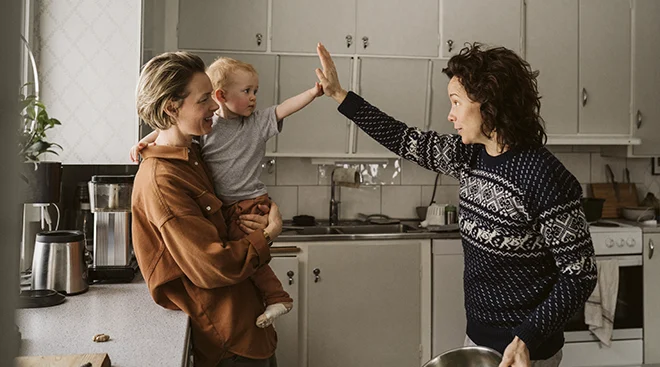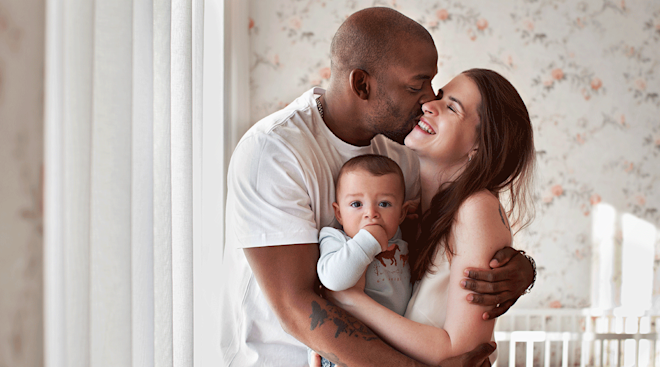Tips for Successful Co-Parenting With a Platonic Friend
For far too long, people believed that in order to build a family, you had to be in a romantic relationship. Thankfully, that’s no longer the narrative, and there are many different avenues that parents take—including teaming up with a friend who’s equally enthused about parenthood through a platonic co-parenting partnership.
Platonic co-parenting can come in many forms, of course. Maybe you’re co-parenting with a longtime friend. Perhaps you’ve partnered with another LGBTQ+ parent to build a family. It’s even possible you found someone recently who shares the same family aspirations as you. While there’s no romance involved, you still share a unique bond and have a strong relationship; after all, you’re in a committed partnership with the goal of raising happy, healthy humans.
But regardless of who you parent with and how strong your bond is, there will inevitably be challenges that can put a strain on your relationship—and possibly even your family dynamic. While co-parenting with a platonic friend takes away some of the difficulties that romance may bring, it does come with its own potential problems.
So what are the best approaches to successfully managing these challenges and ensuring a harmonic present and future? Read on for expert tips to help keep your platonic co-parenting partnership strong.
Jenny Limm, MFT, a marriage and family therapist in Jenkintown, Pennsylvania, points out that most challenges co-parents face fall into the category of family cohesiveness. Discrepancies in consistency, reliability and parenting styles can cause tension between co-parents. Naturally, as Limm notes, these problems aren’t unique to platonic co-parents. Rather, they’re factors that can affect any and all parenting relationships.
No matter what challenge you face, you’ll have a higher chance of success by approaching it together as a unified front. “It seems to work well in situations where co-parents respect one another and each other’s boundaries—where roles are clearly delineated,” says Kathryn Smerling, PhD, LCSW, a family therapy professional in New York City. Changes will continue to occur as your family grows, and if you stay united through these evolutions, your family will come out stronger in the end.
Co-parenting is a true partnership, and you want to establish and maintain well-defined rules to ensure you don’t “infringe on one another’s boundaries,” says Smerling. Once these rules and expectations have been set, it’s important to regularly revisit them and make adjustments where it makes sense.
Specific rules and expectations to revisit will vary by family and situation, but some examples include:
- Changes to a visitation schedule if parents don’t live together
- Rules for introducing your child to a new romantic partner
- Expectations for family gatherings, both immediate and extended (especially during holidays and other important dates)
- Financial obligations for each parent as situations arise
- Daily structure and upcoming schedules
While you likely established roles within your family unit as soon as your child arrived (or even before), Limm notes that it’s also important to think about outsider perspectives. “Others may view and may develop curiosity” about your family makeup.
Obviously, you don’t need to justify or explain yourself to anyone, but you’ll want to address this with your child. Decide on a joint narrative with your co-parent, and continue to have open, age-appropriate conversations as your child gets older.
Communication is key in all relationships. Platonic friends may not feel the need to share as much about their individual lives with one another as romantic partners, but when it comes to parenting, there can’t be any big secrets.
Additionally, Limm points out, platonic co-parents will need to regularly discuss things like their parenting styles, how to discipline their child and changing priorities. Platonic co-parents will also need to regularly check in with each other to ensure they’re both getting what they need from the other. Are you both feeling supported? Does there need to be a change in schedule or boundaries to improve your co-parenting situation?
No matter how old a child is, a display of affection is essential to “building a nurturing, familial feeling,” says Smerling. But it’s important that this attention and affection is not only shared between each respective parent and their shared child, but also between two co-parents.
Even with the absence of romance, you want to demonstrate that you care for your co-parent. This can be expressed in many different ways—take a genuine interest in one another’s lives, step up in times of difficulty and celebrate each other during birthdays and holidays. Ultimately, you want your child to see and know that your family bond is founded in mutual respect and love.
Over the years, a platonic co-parent may meet a new romantic partner and/or bring more kids into their family, and these types of changes can have a big impact on a child’s life. It’s important for both parents to discuss situations as they unfold and work together to ensure that their child feels included and supported throughout any change.
Again, it’s important to maintain open communication during transitions. “Acknowledging the experiences, both positive and challenging, out loud is essential in reducing anxiety and increasing self-advocacy,” says Limm.
Just like in any other family dynamic, your co-parenting relationship and family needs will evolve during your journey, so flexibility and keeping an open mind are key. “You constantly have to adjust your expectations and be very aware as people grow and change,” says Smerling.
It’ll take hard work and patience, but no one ever said parenting would be easy. There are plenty of wonderful advantages to co-parenting with a platonic friend. Prioritizing your dynamic will help you find success as challenges arise. Be nimble, keep boundaries clear, communicate regularly and create a warm, loving environment for everyone involved.
About the experts:
Jenny Limm, MFT, is a marriage and family therapist working out of Jenkintown, Pennsylvania. She is currently a PhD candidate at Widener University. She earned a master’s degree from Drexel University’s Couple and Family Therapy Program.
Kathryn Smerling, PhD, LCSW, is a relationship therapist in New York City, where she also serves as a clinical instructor at Mount Sinai. She earned her PhD from Fordham University.
Plus, more from The Bump:
Navigate forward to interact with the calendar and select a date. Press the question mark key to get the keyboard shortcuts for changing dates.




















































